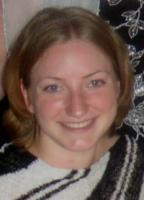McGowan, Michelle | USA

Michelle McGowan is a doctoral candidate in Women Studies at the University of Washington, Seattle, USA. She received her B.A. in Sociology from Boston College (USA) in 2000, and her Ph.C. in Women Studies at the University of Washington (USA) in 2004. She holds the National Women’s Studies Association’s (USA) Graduate Student Award for her dissertation research and an Ernst Mach Grant and IAS-STS fellowship to continue this work in Graz.
Michelle’s research and teaching centers on feminist epistemologies and ideologies and technologies of reproduction. She specifically researches the social, ethical, and political economic implications of reproductive and genetic technologies employed in infertility medicine. Recently she has been working on two separate, but related projects in this arena. In conjunction with Nancy J. Kenney, she has conducted three studies to assess social attitudes towards egg donation and egg donors’ motivations and experiences with donating their eggs in the United States. For her dissertation research, Michelle is analyzing contemporary discourses of preimplantation genetic diagnosis, a technique used in conjunction with in-vitro fertilization to analyze the genetic makeup of embryos before they are implanted into the uterus for gestation. In her work, she employs the theories and tools of the interdisciplinary fields of feminist studies, science studies, and medical anthropology.
Project at IAS-STS: From Sex Selection to Savior Siblings: Social, Ethical, and Political Economic Implications of Preimplantation Genetic Diagnosis
The central objective of this project is to explore the modes of social regulation involved in the proliferation of reproductive genetics, and how users’ agency can be understood through the emergence of these technologies. The question guiding this research is: how do globalization and neoliberalism correspond to the rise in cultural intelligibility of the gene in reproductive medicine? This research is focused on the technological site of preimplantation genetic diagnosis (PGD). Since 1990 PGD has been used in assisted reproduction primarily in the US, Western Europe, and Australia to test one cell of an embryo for heritable genetic conditions. This includes screening embryos for therapeutic genetic matches for children already living with one of these conditions. In addition, within the last few years PGD has also become a popular sex-selection technique at a handful of infertility clinics worldwide.
Michelle is investigating how discursive constructions of PGD reflect and construct cultural assumptions and values in the contemporary historical context by employing discourse analyses of specifically located examples of popular commentary, marketing, and uses of reproductive genetic technologies. Analyses of media coverage of PGD, clinical marketing, and users’ assessments of the technique as discussed in chat rooms will provide insight both into how clinical experts and popular commentators situate their understandings of emergent genetic technologies into their worldviews and how users of reproductive genetics construct their own subjectivities in relation to this technology. She is specifically interested in investigating how relationships of social inequality are reproduced and reconstituted through the ideologies and material practices associated with the use of this technology. The benefits and risks of PGD are undeniably entangled, and as the application of embryonic genetic testing has widened, so too have the ethical, social, and political economic implications of this reproductive genetic technology.
